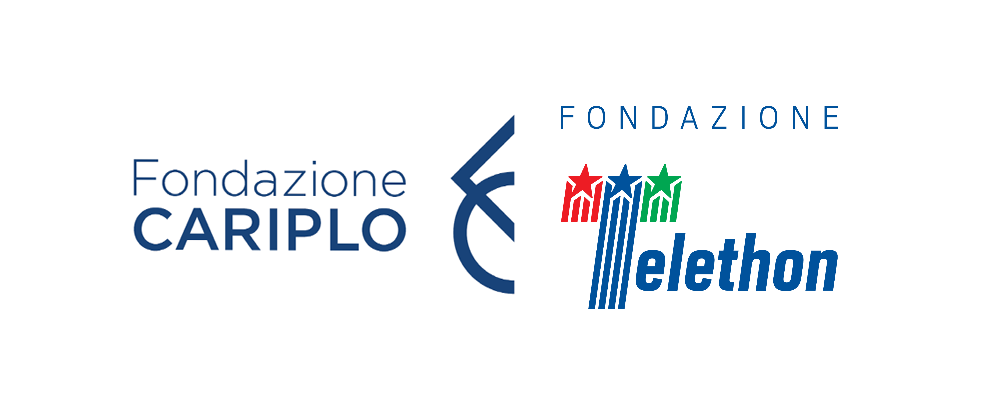
News :
The peer-review process for the projects submitted to the Cariplo-Telethon initiative is completed. Considering that with the funds available by Fondazione Cariplo and Fondazione Telethon it was possible to fund all projects above the threshold of excellence, the Scientific Committee deemed it not necessary to perform the last evaluation phase. Therefore, the interviews will not take place.After the approvals by the Fondazione Cariplo and Fondazione Telethon Board of Directors, on March 31st, all the applicants will receive a communication with the outcome of the evaluation process.
*************************************************************************************
Fondazione Cariplo (FC) and Fondazione Telethon (FT) agreed to start an Alliance to invest in a new joint initiative aiming at fostering basic research to support projects focused on aspects of rare diseases that are largely unknown or poorly understood. Thanks to this Alliance, FC and FT are now pleased to announce the first “Joint Call for Applications” to solicit projects focusing on the study of genes/gene families, proteins, and RNA molecules whose function is unknown in rare diseases, of genetic and non - genetic origin.
Basic research, especially in the field of rare diseases, is still an orphan area of investment, but it is also pioneering for the development of applied research in more frequent diseases. Indeed, the analysis of scientific literature has highlighted the tendency of researchers and funding agencies to focus on a limited portion of the human genome. The most studied genes are not necessarily the most significant: sometimes studying one gene instead of another is simply linked to the timing of its discovery. There are therefore numerous non-coding DNA regions and gene sets - with their relative RNA and proteins - whose function is still unknown, but could potentially play an important role within molecular pathways, physiological and pathological mechanisms.
This call is in support of basic research projects focusing on the study of genes/gene families, proteins, and RNA molecules whose function is unknown (1) in rare diseases (2), of genetic (3) and non - genetic origin.
Eligible projects should focus on the following topics:
Genetic aspects:
- Genes associated with rare diseases whose function is completely or largely unknown
- One genotype, multiple clinical phenotypes
- Variants of uncertain or unknown significance (VUS)
- Genetic modifiers
Molecular mechanisms such as:
- protein folding, stability, degradation
- metabolism
- inflammatory response
- post-transcriptional and post-translational mechanisms influencing gene function and/or expression responsible for different clinical phenotypes for the same disease.
Preliminary data are not mandatory.
For this Call, both Applications for single- and multiple-center proposals are admitted with a maximum budget of 250,000 Euro. Both leading and partner institutions must be Italian public or private non-profit research institutions. Applicants holding a previously funded FC or FT grant may apply. Researchers affiliated to Telethon’s Research Institutes (TIGET, TIGEM, and DTI) are not eligible for this call.
Please note the following Deadlines
Call opening: 6 October 2021 – Forms available on the Telethon grants portal (https://projects.telethon.it).
Application Submission Deadline: 30 November 2021.
Scientific Committee
Massimo Pandolfo, MD – Mc Gill University, Montreal (Canada). Chair
Soren Brunak, PhD – University of Copenhagen (Denmark). Vice-chair
Jacques Beckmann, PhD – University of Lausanne (Switzerland)
Robert M Brosh, PhD – NIH, Bethesda (USA)
Christa Buechler, MD – University of Regensburg, (Germany)
Erica Davis, PhD – Lurie Children’s Hospital, Chicago (USA)
Hugo Guerrero Cazares, MD, PhD – Mayo Clinic, Jacksonville, Florida (USA)
Albert R. La Spada, MD, PhD – UC Irvine, California (USA)
Thomas Liehr, PhD – Jena University Hospital, Germany
Heather C. Mefford, MD, PhD – St. Jude Children’s Research Hospital, Memphis (USA)
Lisa Monteggia, PhD – Vanderbilt University, Nashville (USA)
Bradley B. Olwin, PhD – University of Colorado, (USA)
Harry T Orr, PhD – University of Minnesota, (USA)
Richard Trembath, PhD – King's College London (UK)
Hans van Bokhoven, PhD – Rabdou University, Nijmegen (Netherlands)
Forms
Notes
- (1) In this context, the term unknown refers to targets for which information on the structure, function and interacting molecules and drugs is not known. Based on the classification developed by the Illuminating the Druggable Genome Knowledge Management Center (IDG-KMC), these targets are defined as Tdark. Applicant are invited to check the classification of the target they intend to study at the link https://pharos.nih.gov/. The portal https://www.newdrugtargets.org/, instead, allows to identify possible Tdark starting from the disease to be studied.
- (2) A disease is defined as "rare" when its prevalence, as the number of cases present on a given population, does not exceed an established threshold. In the EU, the threshold is set at 0.05% of the population, or 5 cases out of 10,000 people. The diseases admitted to the study in this call should be in the Orphanet database.
- (3) In the context of rare genetic disease, monogenic and polygenic diseases can be considered.
In case of doubts, please contact the scientific staff at telethonjointcall@fondazionecariplo.it